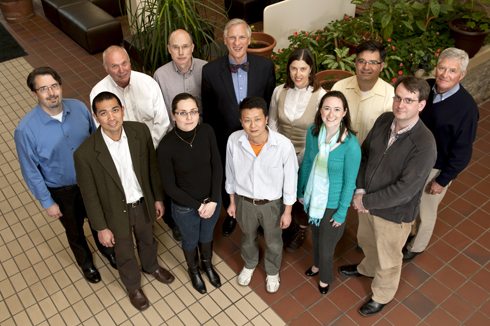Virginia Tech forms Center for Drug Discovery

Virginia Tech has established a new Center for Drug Discovery to accelerate research that could lead to new treatments for cancer, Alzheimer’s disease, cardiovascular disease, atherosclerosis, diseases of the central nervous system, and parasitic diseases such as malaria and Chagas disease.
The center is housed in the College of Science, with support from the College of Science, the Fralin Life Science Institute, the Institute for Critical Technology and Applied Science, and the College of Agriculture and Life Sciences.
University Distinguished Professor David Kingston will serve as director. Principal participants -- faculty members affiliated with the center -- are those currently leading the university in the drug discovery and delivery area, with more than $29 million combined in current research support. They hail from the College of Science, the College of Agriculture and Life Sciences, the College of Natural Resources and Environment, the College of Engineering, the Virginia-Maryland Regional College of Veterinary Medicine, and the Virginia Bioinformatics Institute.
It is envisioned that the center will be a major force in drug discovery and delivery in the United States, with the capacity to discover drug candidates and develop them to the point that they will make it to Investigational New Drug (IND) status in the pharmaceutical industry. It is designed to foster communication, education, and sharing of facilities among members. Members' interests are diverse; for a full listing visit the website.
As major pharmaceutical companies downsize and layoff discovery scientists, the role of universities in the field of drug discovery research is paramount, according to Kingston.
"The changing landscape of drug discovery provides real opportunities for universities to make significant contributions to the process of drug discovery and delivery, provided that they can offer the intellectual, physical, and financial resources to capitalize on the situation," said Kingston. "The Virginia Tech Center for Drug Discovery will provide the focus that Virginia Tech needs to do this. One example is the opportunity to resurrect drugs that failed in clinical trials by developing new delivery methods."
Maria Belen Cassera, assistant professor of biochemistry and an affiliated faculty member with the center, said that the center will provide new resources for her metabolomics research. Cassera investigates the metabolic pathways used by the malaria-causing parasite Plasmodium falciparum, in order to develop more effective drug treatment.
"The center is meant to bring everyone together under one umbrella," Cassera said. "We each have different ideas, capabilities, and equipment, and there is great potential in increased collaboration."







